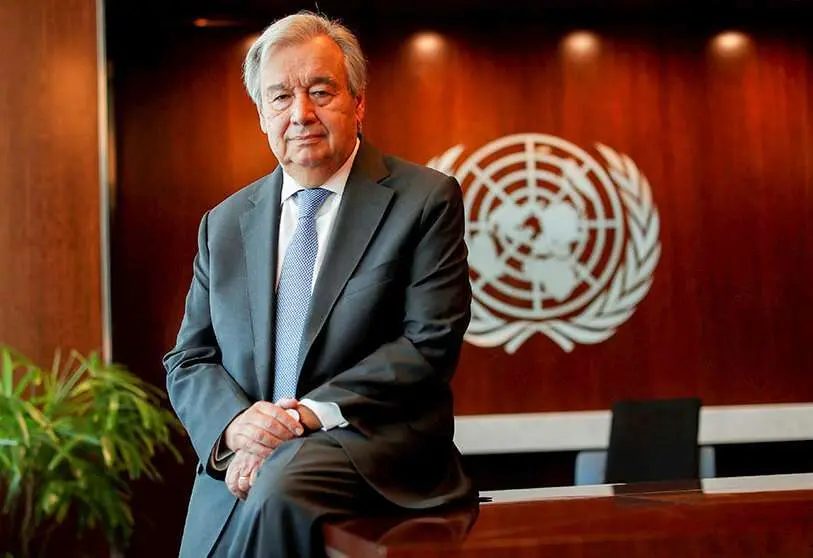Libya Quartet demands withdrawal of foreign forces from Libya

The members of the so-called Libya Quartet - made up of the UN, the African Union, the EU and the Arab League - held a virtual summit on Tuesday to discuss the crisis in Libya and define a roadmap for a short-term solution. Both the United Nations and the other actors involved in the talks "welcomed" the recent progress towards a political solution in Libya.
UN Secretary-General António Guterres, his Arab League counterpart Ahmed Aboul Gheit, EU High Representative for Foreign Affairs and Security Policy Josep Borrel, and Vice-President of the African Union Commission Moussa Faki Mahamat underlined during the meeting the solutions to advance the transition in the North African country. The members also established several points in common, all of which are included in the joint missive published at the end of the meeting.
The main demand of the Libya Quartet is the withdrawal of all foreign forces from the country. The group called on the new government, the other Libyan authorities and the 5 + 5 Joint Military Commission (JMC) to accelerate their efforts towards the full implementation of the Ceasefire Agreement reached on 23 October. In it, the parties agreed to the withdrawal of all military units and armed groups and the withdrawal of mercenaries and foreign fighters within a maximum of three months, a deadline that has already passed.
UNSMIL - the UN Support Mission in Libya - estimates a deployment of 20,000 foreign fighters in Libya, mostly from Turkey, Russia, Chad and Sudan. Incidentally, the Libya Quartet unanimously condemned continued violations of the UN arms embargo in favour of forces affiliated with the Government of National Accord (GNA) and those associated with the Libyan National Army (LNA).

The Joint Military Commission, in cooperation with UNSMIL, has so far been unable to establish an effective mechanism to monitor compliance with the ceasefire. For this reason, the UN Security Council approved last Friday the dispatch of 60 international observers to monitor full compliance with the agreement and to improve Libya's security, with the approval of the Libyan Presidential Council.
In the joint declaration, the society also recognised the significant progress of the Libyan Political Dialogue Forum (LPDF), promoted by the UN itself. This progress materialised in the House of Representatives' vote of confidence in the new National Unity Government and in the transition of power, now in the hands of President Mohammad Menfi and Prime Minister Abdul Hamid Dbeiba.
The Quartet expressed "full support" for the holding of the general elections scheduled for 24 December. They also reinforced their support for the new political institutions and urged them to fulfil their commitment to appoint at least 30 percent women to senior executive positions.
On the economic front, the Quartet welcomed the unification of the Board of Directors of the Central Bank of Libya, the devaluation of the Libyan Dinar and the presentation by the new Government of National Unity of a unified budget later this year. Positive changes have taken place, but there is still ample room for recovery. The civil conflict coupled with the COVID-19 crisis, with the corresponding decline in oil prices and exports - the country's main asset - drove Libya's economic situation into the abyss.
Finally, the Quartet bodies agreed to continue regular meetings to monitor the democratic transition in Libya. The next summit will be held in the second half of 2021, according to the joint letter.

Libya's interim Prime Minister Abdul Hamid Dbeiba received a delegation of 11 Egyptian ministers led by Prime Minister Mostafa Madbouly in Tripoli on Tuesday. It was the first visit by an Egyptian head of government to Libya since the overthrow of dictator Muammar al-Gaddafi. "Before 2011, there were millions of Egyptians working in Libya (...) and now we are working to bring these relations back to the peak of their maturity," Madbouly said.
The leaders signed a memorandum of understanding and reached multiple agreements on electricity, telecommunications, infrastructure and transport. Egypt's investment in Libya amounts to $450 billion. In addition, the Egyptian prime minister announced the reopening of Cairo airport for Libyan aircraft and revealed both the construction of a hospital in Tripoli and the upcoming opening of an Egyptian university in the country.
A week earlier, the Libyan prime minister visited Ankara accompanied by 14 cabinet ministers. Almost the entire interim government held a meeting with Turkish President Recep Tayyip Erdogan, which resulted in the signing of five trade agreements in the energy and construction sectors, among others.










